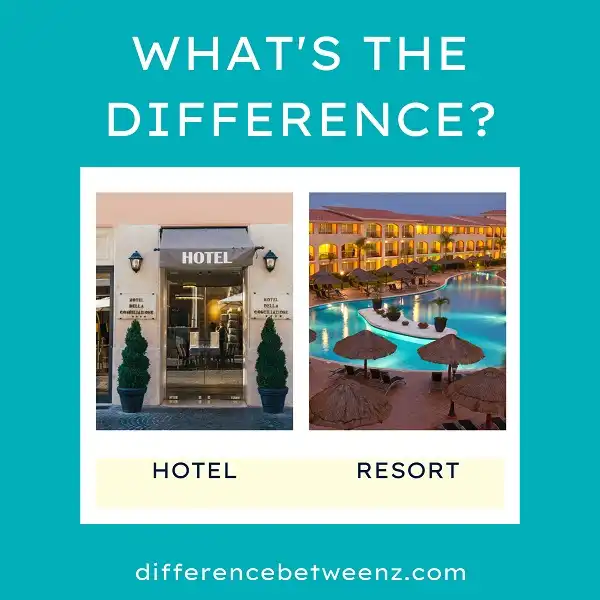If you’re thinking about taking a vacation, you may be wondering whether to stay in a hotel or resort. Both have their pros and cons, but here’s a look at the key differences between them. Hotels are more budget-friendly, while resorts offer more amenities and activities. If you’re looking for a place to relax and enjoy all the on-site facilities, then a resort is likely your best bet. However, if you’re mostly interested in exploring the local area and want somewhere affordable to stay in, then a hotel is probably your best option. Ultimately, it comes down to what you’re looking for in a vacation.
What is Hotel?
A hotel is an establishment that provides paid lodging on a short-term basis. Hotel rooms are usually numbered to allow guests to identify their rooms. Hotel guests have access to a variety of services, such as room service and laundry service. In addition, most hotels provide facilities for conferences and other events. Depending on the size and location of the hotel, other amenities may be available, such as a swimming pool, a fitness center, and a business center. Hotel staff is typically responsible for providing a clean and comfortable environment for guests, as well as helpful and friendly customer service.
What is Resort?
A resort is a noun that describes a place that is resorted to for relaxation or pleasure, typically one with facilities such as entertainment and accommodation. It can also be a place to conduct business meetings. Resorts are usually located in picturesque or otherwise distinctive locations, such as forests, lakes, and beach towns. A resort hotel typically includes a large number of guest rooms, restaurants, swimming pools, and recreation facilities such as golf and tennis courts. Resort towns tend to offer professional services such as guides and equipment for various outdoor activities. Some examples of well-known resorts are Aspen Ski Resort in Colorado and Sun Valley Resort in Idaho in the United States, Whistler Blackcomb in British Columbia, Canada, and Courchevel in the French Alps. Most resort towns have one or more associated resort hotels. Resort town status often results from the establishment of resort amenities including lodging, dining, and recreation experiences that attract visitors seeking these experiences. Resort town status may also result from officially designating a community as a resort town through legislation or municipal planning. Aspen Ski Resort is one of the oldest continually operated ski resorts in North America.
Difference between Hotels and Resorts
Hotels and resorts are both types of lodging that offer temporary accommodations to travelers. However, there are a few key differences between these two types of businesses. Hotels typically offer basic accommodations, such as a bed and a bathroom, while resorts may also offer additional amenities, such as a swimming pool, a spa, and on-site dining. Hotels tend to be located in urban areas, while resorts are usually situated in more rural locations. Hotels also typically cater to business travelers, while resorts cater to leisure travelers. As a result, hotels typically offer features such as meeting rooms and business centers, while resorts offer recreation and entertainment options. While there are some key differences between hotels and resorts, both types of businesses can provide guests with a comfortable place to stay during their travels.
Conclusion
Although the line between hotels and resorts may be blurry, there are some key distinctions that set them apart. Generally speaking, a hotel is a more affordable option with fewer amenities while a resort offers guests more luxurious options and experiences. If you’re looking to book a getaway for your family or friends, it’s important to understand the difference so you can choose the right property for your needs.


